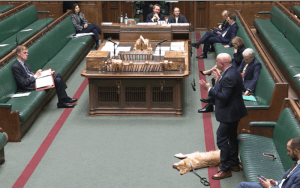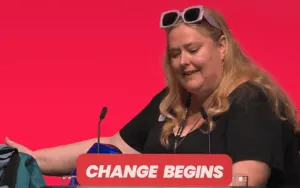A disabled woman is challenging the government’s failure to ensure that she can vote secretly and independently in elections.
The high court has granted permission for the case being brought against the Cabinet Office by Rachael Andrews to proceed to a full hearing, after the court decided that her case was “arguable”.
Andrews, from Norwich, who is blind, said she had repeatedly been left distressed and upset by a system that either left her unsure whether she had voted for the right candidate, or relying on an election official to tell her whether she had marked the correct box on the ballot paper.
She said: “It is the fact that it is not secret that distresses me so much. As a disabled person I am fairly used to asking for people’s help.
“But the fact that I have to ask somebody to do something that is so simple, and it still isn’t private, it just distresses and upsets me more than I can explain.
“I feel like I am 12 years old, like I am not a confident, whole person.”
Andrews (pictured) has already secured one legal victory, over her local authority, Broadland council, following its failure to enable her to vote independently and secretly at the 2015 election.
Since then she has cast her vote in the 2016 European Union referendum and at the 2017 general election, but on both occasions – despite the council’s best efforts – she has still been unable to vote independently and in secret.
She blames the government, because she says the tactile voting device (TVD) – a plastic template placed over the ballot paper that is supposed to allow blind people to vote in secret – is not fit for purpose.
She is challenging the government’s decision to designate the TVD as a suitable device to allow blind people to vote without any need for assistance under the Representation of the People Act 1983.
But she is also arguing for her right to a secret ballot under the European Convention on Human Rights.
Andrews successfully settled her claim against Broadland council for failing to have a TVD available for the 2015 general election.
But although she said its council officers have since done “everything they can within the law” to help her at subsequent elections, the system is still failing her.
In 2016, when voting in the referendum, she was not sure if she had placed her cross in the correct box and had to ask the presiding officer to tell her.
And last year, at the general election, she tried to use a postal vote, and was assisted by a member of council staff, but still had to use a TVD.
She said: “To this day I do not know if I put the cross in the place that I intended to vote.
“He read everything out to me and I am assuming he also saw my vote as well because he was literally sat right next to me.”
Andrews, who is represented by human rights lawyers Leigh Day, said that other countries had introduced systems that allow blind voters to vote more easily, including introducing “audio voting booths” and telephone voting.
Graham Kirwan, who was forced to take legal action against his own local council over its failure to make the process of registering to vote and voting accessible to him as a visually-impaired person, said: “I fully appreciate the frustrating difficulties Rachael repeatedly faces having, like many other visually-impaired voters, faced them myself.”
He pointed to devices such as audio and magnification aids which could assist independent and secret voting, and said the government was “simply kicking accessible voting into the long grass”.
He added: “I 100 per cent support Rachael’s legal challenge and wish her all the best with her action.”
The government has argued in correspondence with Andrews’ lawyers that the legal challenge is unnecessary because it is already addressing the issue.
This refers to pledges in its much-criticised response to a consultation on how to make voting more accessible.
The government talked in its response in September about promoting guidance, improving training, and the possibility of allowing disabled voters to try out practice ballots in advance of elections.
And it said it would consider what improvements could be made for voters with sight loss “and look to make the necessary legislative changes when a suitable opportunity arises”.
But Andrews’ lawyers point out that the government’s response did not say what these improvements would be, or when it would change the law.
The Cabinet Office said it could not comment on ongoing legal cases.
But a Cabinet Office spokeswoman said: “We consult with disabled individuals, and organisations that represent them such as RNIB regularly, to hear about their experiences of voting and recommendations on how government can make elections more accessible.
“Every voice matters and this government is committed to building a democracy that works for all.”
The government’s accessibility of elections working group is set to meet in January, and will discuss again the improvements that could be made to the support provided to visually-impaired voters in polling stations.
But Andrews said: “I have always voted in general elections. I see it as a very important civic duty and feel very strongly that I should simply be afforded the same right to vote independently and in secret as everyone else.
“Sadly, I believe that many blind voters are currently put off voting because of the difficulties they face.
“I am disappointed that it has been necessary to commence legal proceedings but am keen that the government stops dragging its feet and takes action to allow me to vote independently and secretly in time for the next general election.”
Sean Humber, head of Leigh Day’s human rights department, said: “The provisions made for blind voters by the government are quite simply not fit for purpose.
“The right to vote freely, independently and in secret is fundamental to any democracy.
“We hope that the courts will hear our client’s challenge and order the government to reconsider the assistance they provide for blind voters.”
A note from the editor:
Please consider making a voluntary financial contribution to support the work of DNS and allow it to continue producing independent, carefully-researched news stories that focus on the lives and rights of disabled people and their user-led organisations.
Please do not contribute if you cannot afford to do so, and please note that DNS is not a charity. It is run and owned by disabled journalist John Pring and has been from its launch in April 2009.
Thank you for anything you can do to support the work of DNS…

 Three firms of solicitors working with disabled people on possible benefit cuts legal cases
Three firms of solicitors working with disabled people on possible benefit cuts legal cases DWP is ‘broken and not fit for purpose’, says disabled MP
DWP is ‘broken and not fit for purpose’, says disabled MP Labour and its disability minister appear to be in dispute over assistance dog discrimination at party conference
Labour and its disability minister appear to be in dispute over assistance dog discrimination at party conference